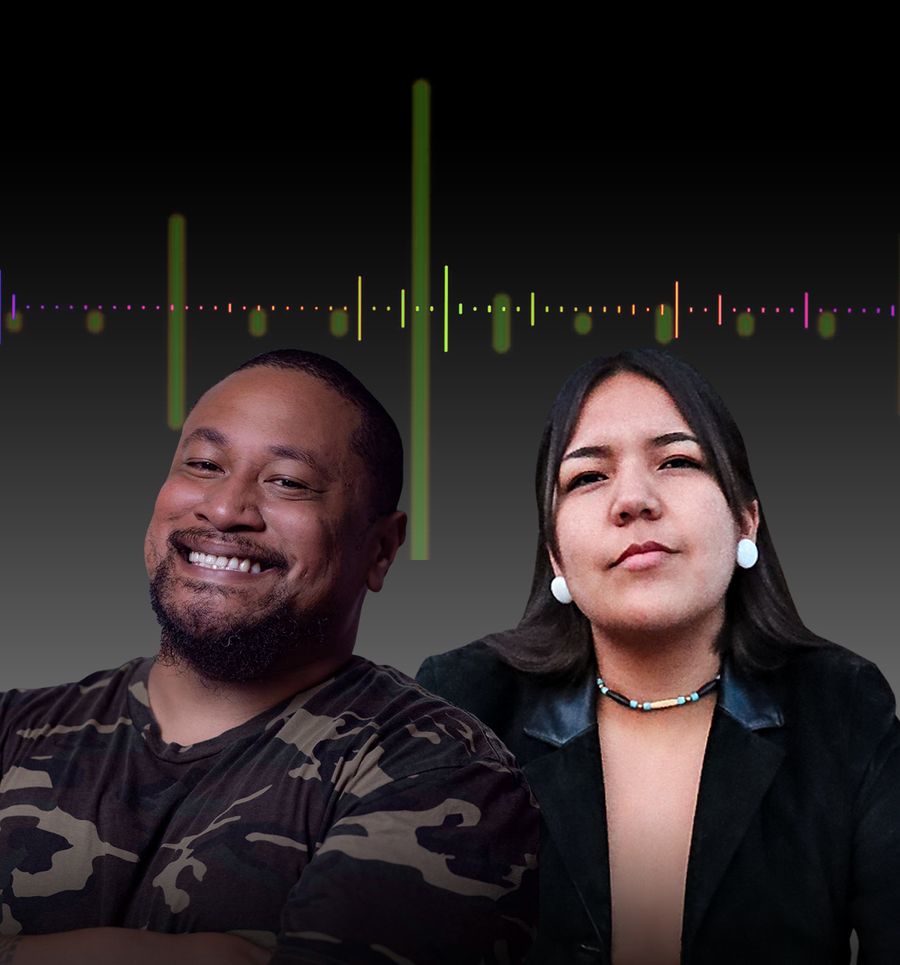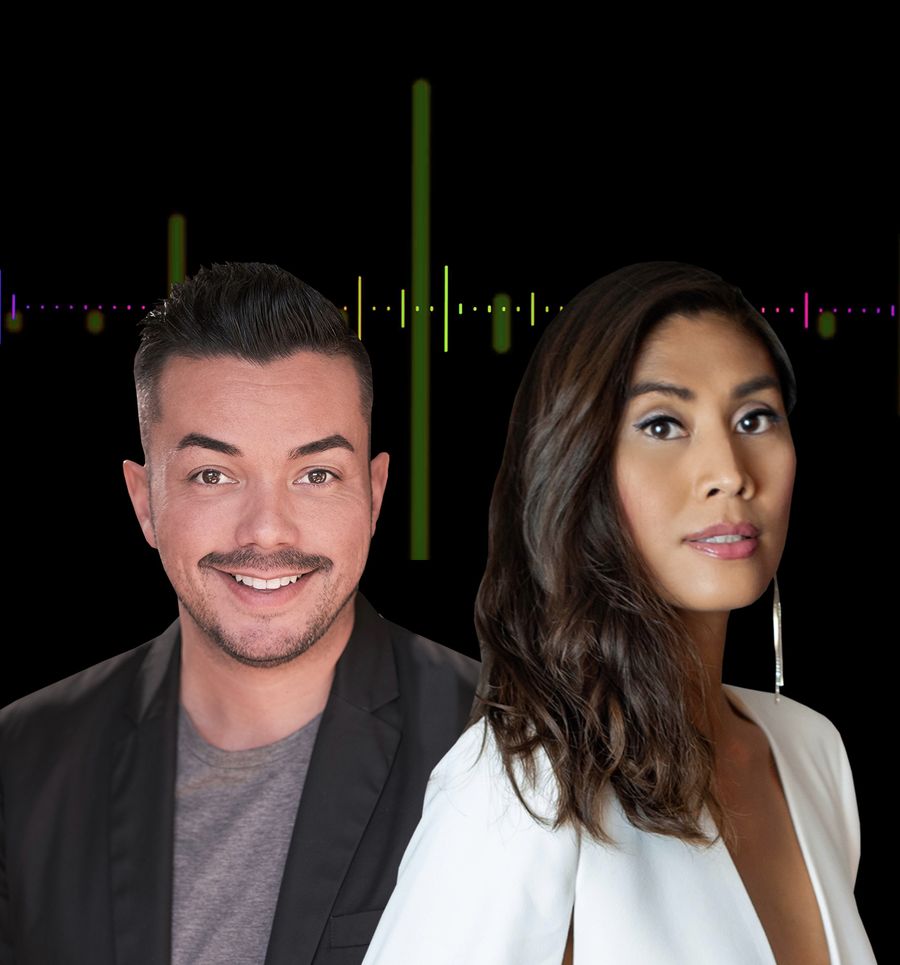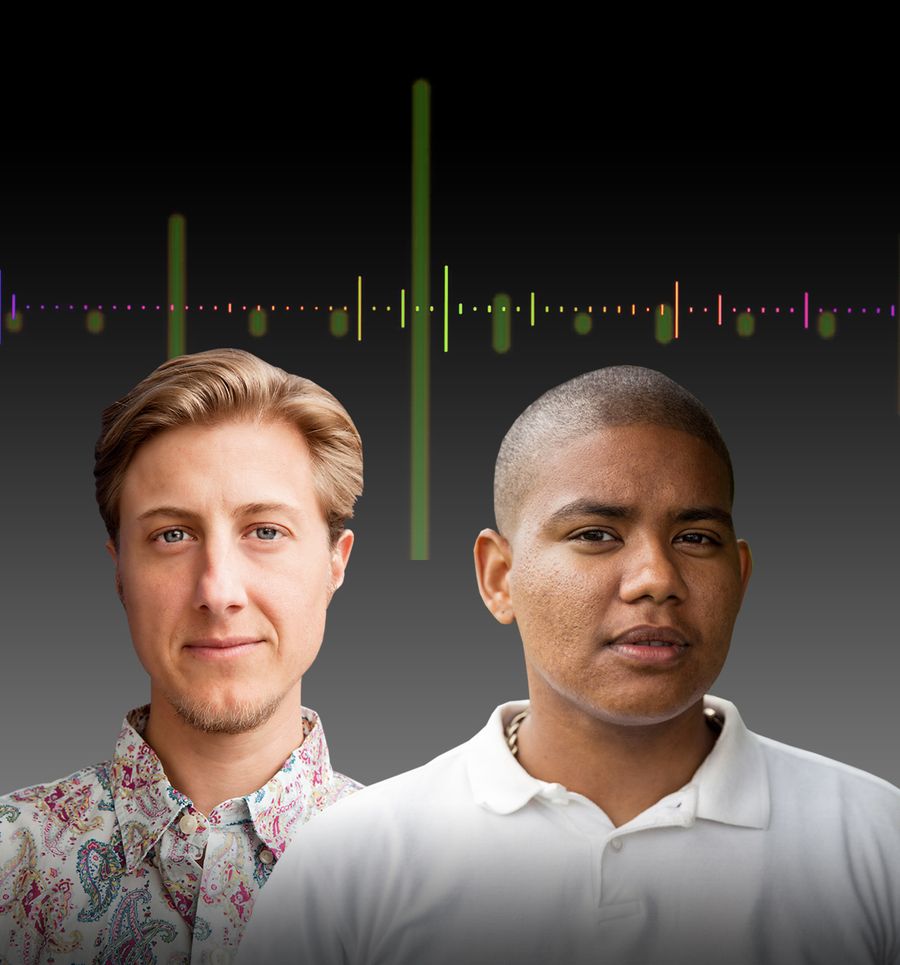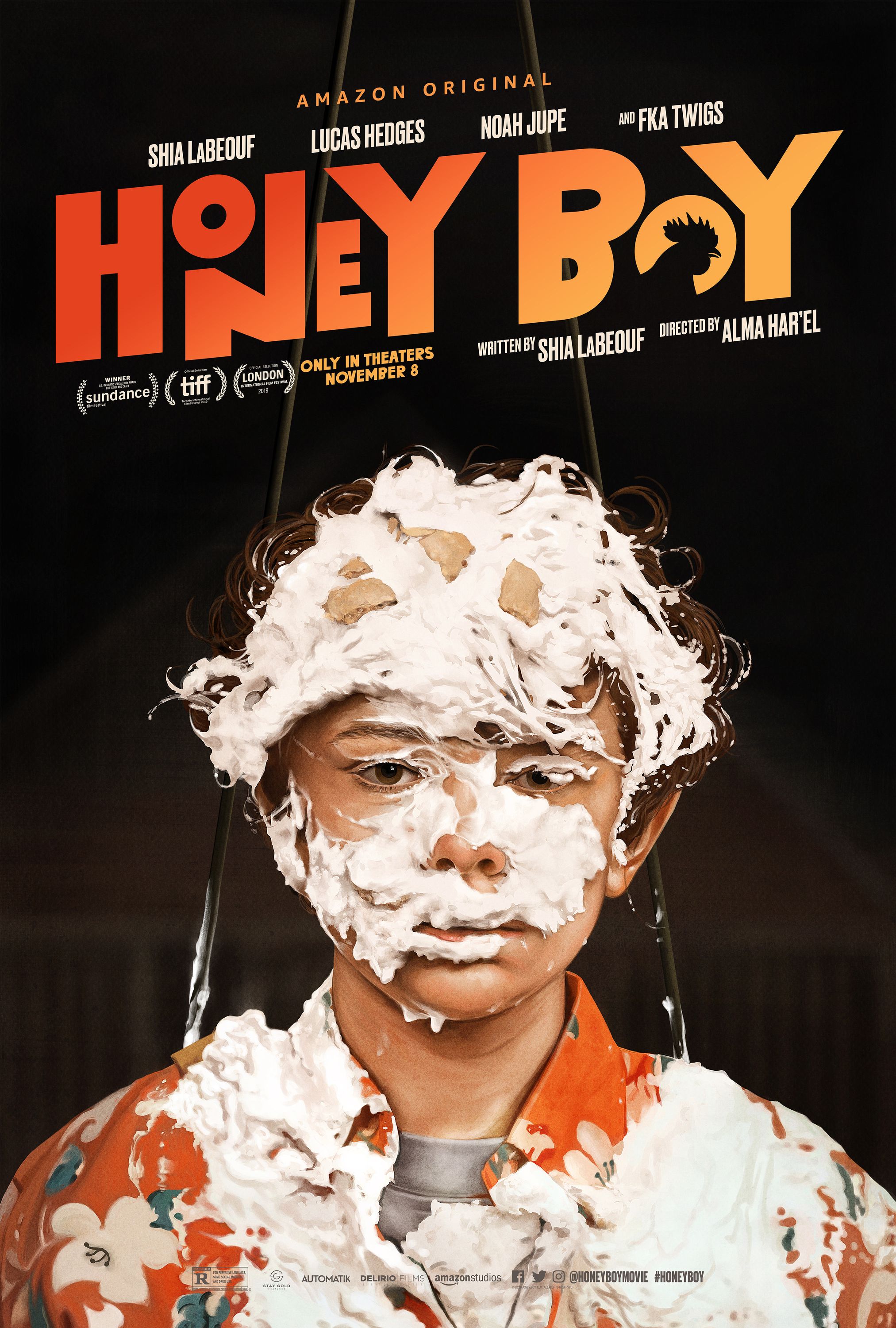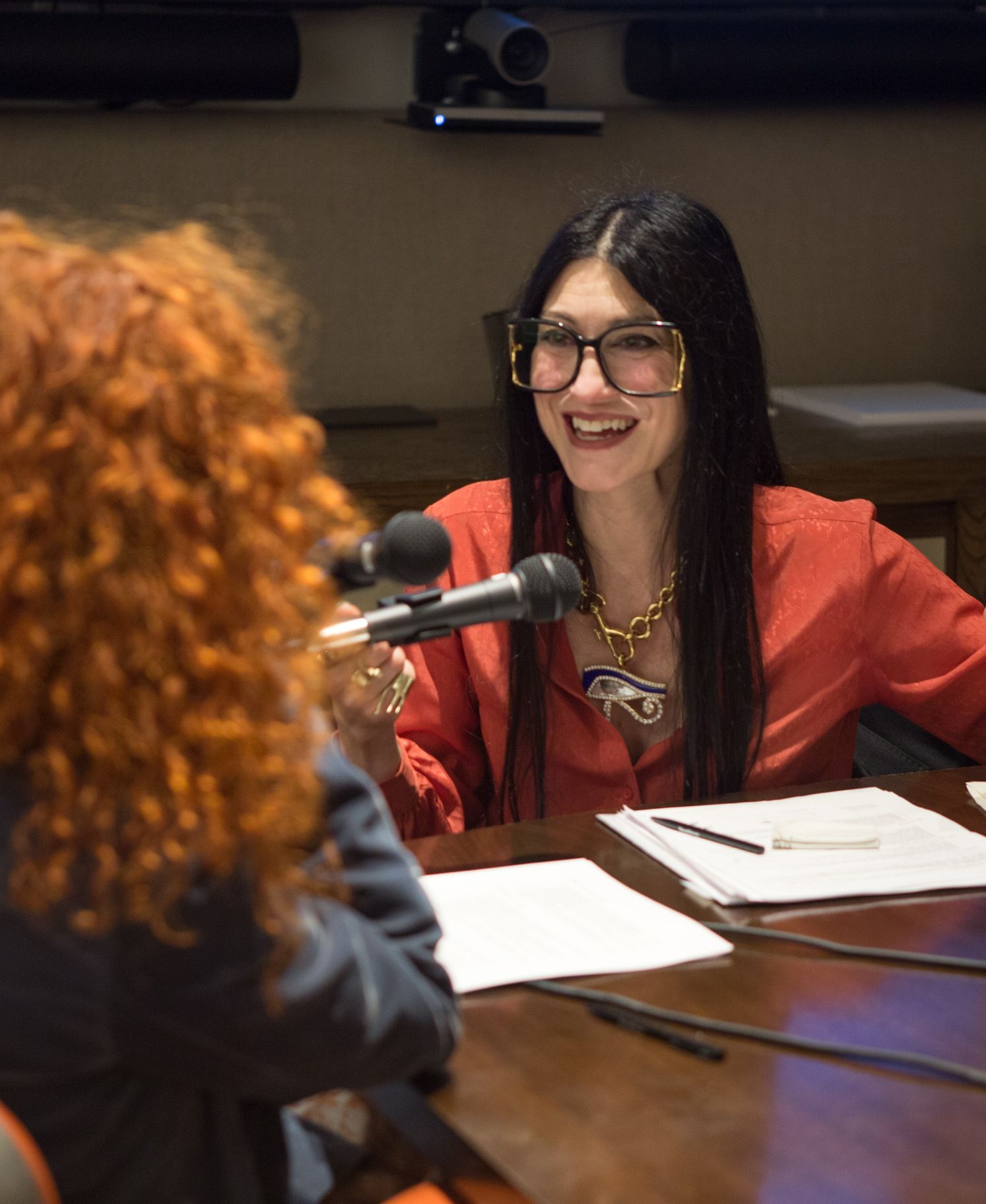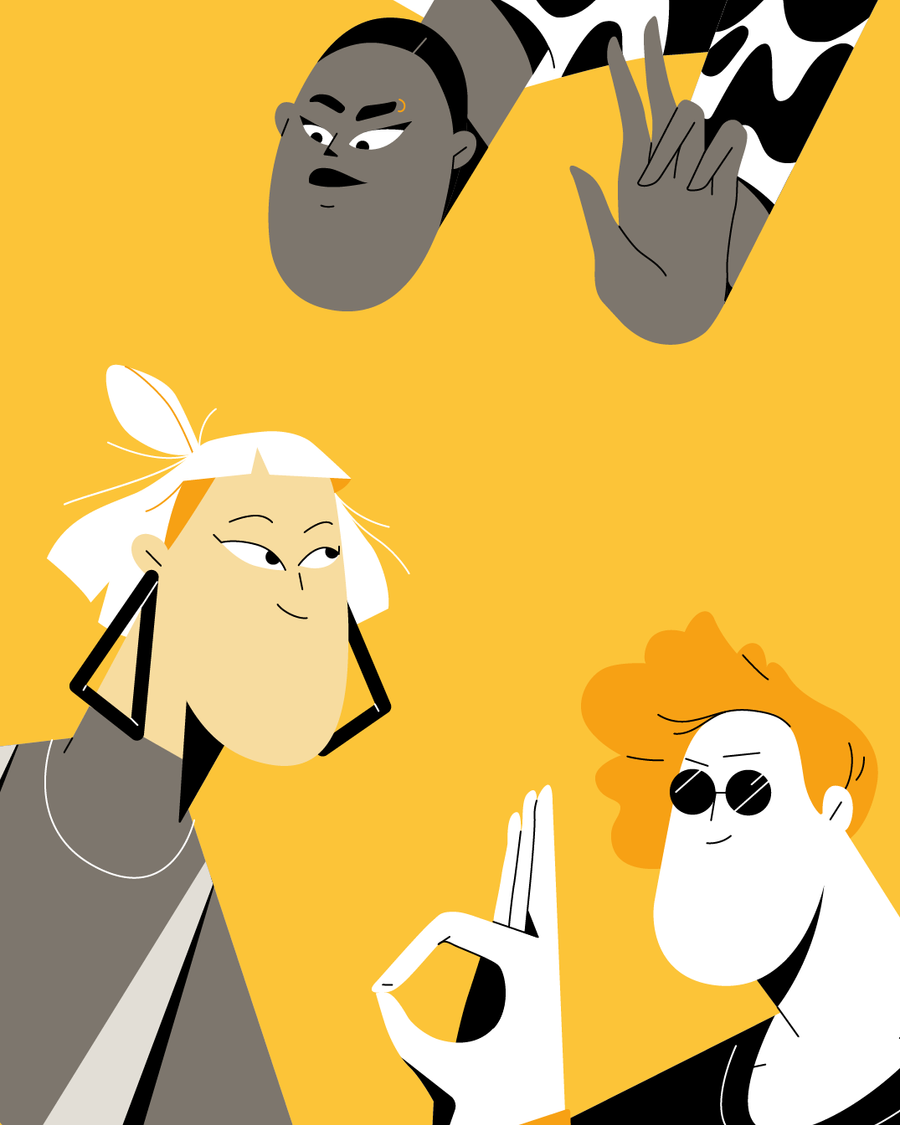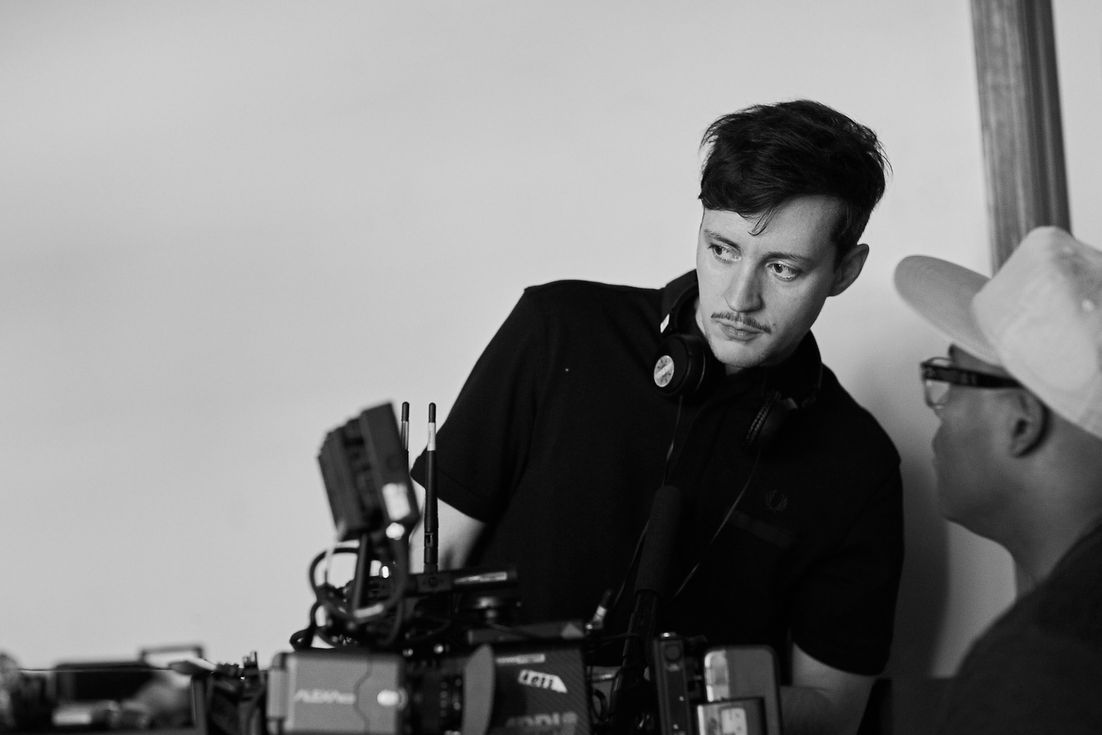On the series finale of "FREE THE WORK Focus: Pride," the FTW podcast mini-series, supported by GLAAD, Tanu Gago, the multitalented filmmaker, visual artist, photographer, curator and producer based in New Zealand, and founder of FAFSWAG (a vibrant collective that celebrates LGBTQIA+ Pacific Islander culture) and a queer Ojibwe directorVictoria Anderson-Gardner have a candid and soulful conversation on their hopes for reclaiming time and Indigenous narratives, the unfair expectation of educating the larger public on decolonization, the importance of orgs like imagineNATIVE and the genesis of FAFSWAG.
Subscribe to the FREE THE WORK podcast on Amazon Music, Apple Podcasts, Spotify, Stitcher, and Soundcloud to listen to this episode and revisit the entire series!
Then be sure to follow @GLAAD and @FREETHEWORK across Twitter, Instagram, and Facebook.
Scroll down for the full transcript of the episode!
Tanu Gago
Tanu Gago MNZM is an award-winning photographer, interdisciplinary artist, and filmmaker. He is a 2020 Arts Foundation Arts Laureate, 2020 CNZ Pacific Arts Contemporary artist recipient, the 2014 Auckland Festival of Photography Annual Commission recipient, the 2018 Macmillan Brown artist in residence, and in 2019 was inducted into the Order of Merit, with Queen's honours for services to Pacific arts and the LGBTQIA+ community. Gago is also the creative New Zealand – 2020 Contemporary Pacific Artist Award recipient. A Samoan Immigrant raised in South Auckland, Gago works predominantly in arts and activism, arts curation and mentoring, and producing and touring Queer Indigenous works for the stage. Gago is a founding member of the Auckland vogue scene, as well as the cofounder and creative director of Queer Indigenous Arts Collective FAFSWAG, whose innovative and boundary pushing art works and performances have seen the Collective tour the world representing Aotearoa and Polynesia.
Concerned with identity, representation and the politics of queer masculinity, Gago’s photographic works sit in a number of public art collections including the Auckland Museum and Auckland Art Gallery. Gago has spent the past ten years invested in cultivating the unique and important voices of artists and activists within the queer Indigenous space, and remains committed to supporting and preserving pathways for future generations.
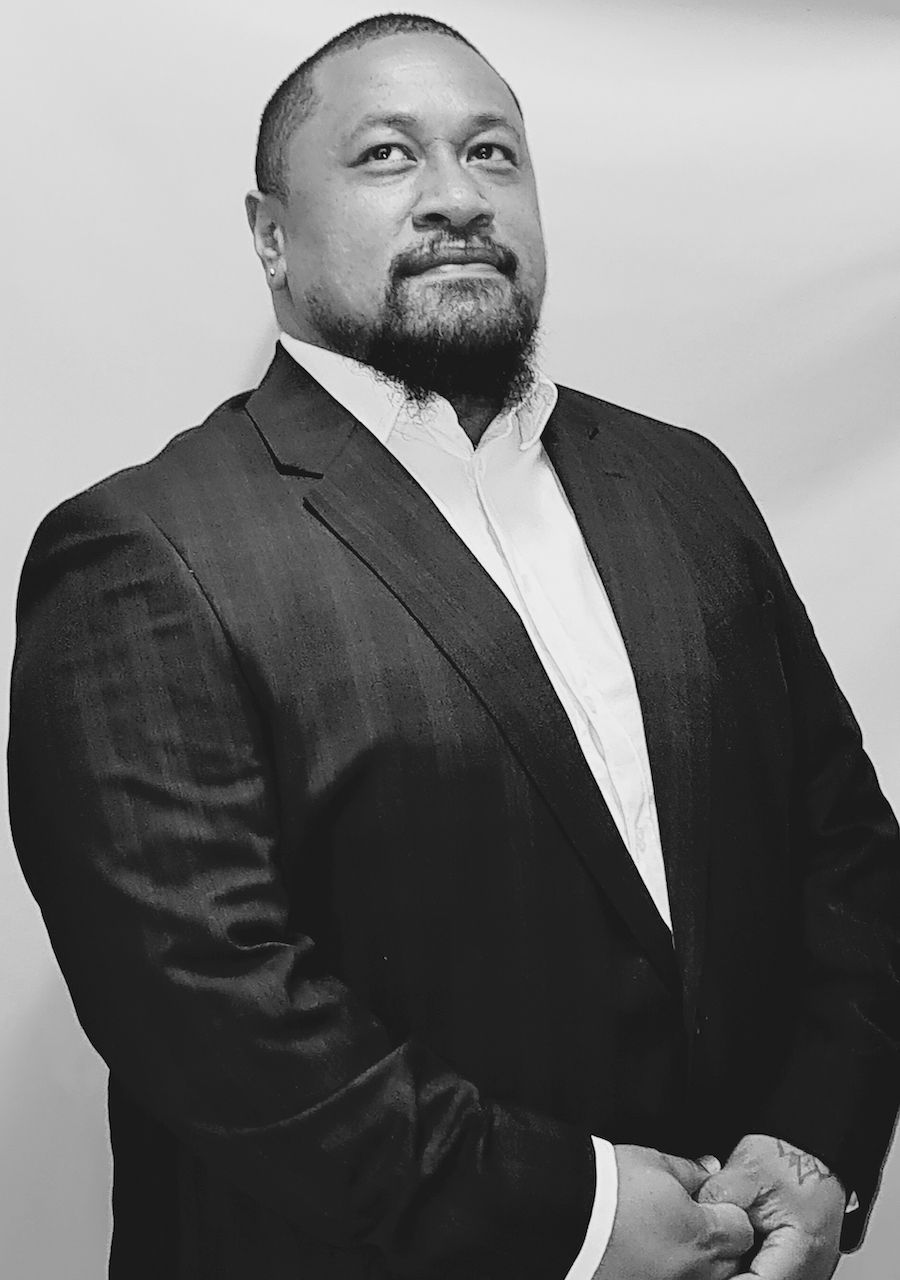

Victoria Anderson-Gardner
Victoria Anderson-Gardner is an award winning Ojibwe filmmaker from Eagle Lake First Nation, Ontario. They graduated from Ryerson University with a Bachelor of Fine Arts Degree in Film Studies. Victoria is focused on creating Indigenous content, showcasing underrepresented communities and using their skills as a filmmaker to educate. Victoria recently won the Glenn Gould Protege Prize for their work.
With over 4 years of experience in the film industry, Victoria is a director and producer who has worked on a variety of productions but is most well known for Tenaya (TIFF’s Big Pitch Audience Choice Award 2020), Becoming Nakuset (CBC Gem and Loud Roar Productions short doc, won the Best Short Film, Audience Choice Award at imagineNATIVE 2020), The Hurt That Binds Us (Voices With Impact short doc; won Best Documentary at the Ryerson University Film Festival), and Mni Wiconi: Mitakuyelo (imagineNATIVE and Netflix commissioned short doc). They are currently working as the assistant director on Crave’s new docu series called Thunder Bay and currently sit as an Advisory Board member for Art With Impact where they sit on the jury for their monthly film competitions.
Chloe Coover: What's up world? We're here with the FREE THE WORK podcast. With this episode, we're wrapping up FREE THE WORK focus pride. Our special miniseries supported by our friends at GLAAD spotlighting some of today's leading LGBTQIA+ creators. For the finale, queer Ojibwe director Victoria Anderson Gardner chats with New Zealand based Samoan artists Tanu Gago, who also founded FAFSWAG, a collective that celebrates LGBTQIA+ Pacific Islander culture. Together, they talk about tiny things with unique artistic inspirations, but decolonizing art means to them and their hopes for indigenous storytelling.
Victoria Anderson Gardner: Hi, everyone, and thank you for joining us for the FREE THE WORK podcast mini series that is supported by glad if you're just getting familiar, FREE THE WORK is a nonprofit global initiative and searchable talent discovery platform for underrepresented creators. And just a little disclaimer, we got to say the views and opinions of the guests do not necessarily state or reflect those of FREE THE WORK. Hi, I'm Victoria Anderson Gardner and I am an Ojibwe. filmmaker, director, producer. And I am currently working on a couple independent projects. And I also do a lot of contracts for other companies such as crave for Netflix, and just whatever little jobs I can find for myself. And here I am with Tanu Gago, the multi talented filmmaker, visual artist, photographer, curator and producer based in New Zealand, where he also founded fast sway a vibrant collective that celebrates LGBTQ i A plus Pacific Islander culture. We're so honored to have him here today. If you want to go ahead and introduce yourself.
Tanu Gago: Hi everybody. My name is Tanu Gago. I am add to this queer activist and filmmaker from Bay currently based in my work here, and Tamaki Makoto and Altidore New Zealand. My work currently is based in the Pacific diaspora in Auckland.
VA: Alright, so I guess kind of just what I want to start off with talking about is kind of just getting to know a little bit more about the work that you do. And also kind of explaining the mediums that you spin across because you sent across a few mediums.
TG: Yeah. I feel like that's a- What do you call it, I feel like that's an unnatural state for most creatives today, is that we're kind of occupying or moving through different modes of practice. And so when I look at my peer group, it's quite common for all of us to be doing everything all at the same time. And I think it's part of the interconnected world that we're kind of operating as well, but to say that I have a formal background in film. I studied filmmaking and orphaned and graduated from film school in late 2009, which feels like a lifetime ago. And that's mostly because it was. Yeah, I remember graduating from film school and just feeling a little bit institutionalized. For that process. It was very, it felt more bureaucratic than I thought filmmaking would actually feel. And a lot of what we were doing was very compartmentalized. Mostly because they were training vocationally. So if you entered the school as director of photography or camera person that your vocation was specialized. And so I came through as a right to the inspector. And so I entered, hoping to get my hands on a camera. And then they told me that I wasn't allowed to touch the camera. But it wasn't my job. It was someone else's job. So I was like, oh, maybe I'm in the wrong place. And then I found out that my job was kind of just like this boring administration of how to maneuver a camera or camera departments. And so I did that and had that experience. And I didn't feel like I grew a lot in my training, but it wasn't until I was out in the practical world applying my skill that I actually felt like I learned a lot. Yeah, and so, part of the kind of awful anxiety of feeling a little bit institutionalized into the kind of pursuing a career as a photographer, and as an artist in fine art work. And I don't, I'm very fortunate in that I had a lot of success in doing that. So, I won a couple awards as a photographer, and was able to, like build a really sustainable art practice over the last 10 years and, and so, artists, the art world is kind of like my home now. But in recent years, I've just been a bit more interested in returning to my film practice. And so I'm having this kind of full circle moment, where I'm really interested in how I can apply all this life experience and kind of accumulated skill back into my original passion, which is filmmaking.
VA: So in regards to, I guess, like for what you're trying to apply your film to, what are like the projects that you're trying to apply that to now like, that would, I guess, crossover into like other mediums?
TG: Well, um, like, I started my career in stills photography, I wanted to take a step back from moving images and look at a singular frame, and how can you tell a story if you only have one shot. And so, you know, over the years, I've tried to refine that process. And then, slowly, as I was moving for my practice, my still photography practice slowly evolved into a moving image practice. And so I was slowly kind of modulating my way back to cinema as the language. And so for the longest time, I've just been producing these video installations, for galleries and for public presentations. So I like to think of cinema as this kind of texture, sculptural object as well. And so, yeah, a lot of my storytelling is presented in installation context. And in 2018, I had the opportunity of working with Piki Films, which is Taika Waititi's production company. And we created an interactive documentary called fafswagvogue.com, which you can actually visit. Currently, it's a free, interactive site. And essentially, it is five key stories from key figures from our ballroom community here in Altidore. And it's told for an interactive experience where you can watch them battle each other, and then pick a winner. And then after you select a winner, you get to see their backstory, and it kind of peels away some of the storytelling layers, and you get to have a more intimate experience with the person that you selected. You know, it was, it was quite interesting way to come back to filmmaking because I was operating in a mode of documentary, but then we were also innovating around the kind of technical delivery of the work, which is not very conventional, and breaks a lot of tradition while at the time, and 2018. And so it was an interesting film to tour and festivals, because you had to present it in an interactive medium where people could play with the characters in them. So often, it was placed into their virtual reality labs, but then it also has this very traditional series of films after you complete the interactive components. And I had such a great time with picchi, the production company that we decided to start developing a feature film project from that. And so that's kind of been the journey back to filmmaking. So for the last, I guess, three years we've been writing and I'm just at a place where I'm at an oil field. I'm not sure if you can relate to this, but it just feels like you've been working on it for so long. I just can't wait to see it. Me.
VA: Yeah. I have definitely, I've been on a couple projects like that where sometimes it feels like you're not sure if it's ever actually going to get done.
TG: My number one question to the producers, I was like, a week, are we still gonna make this?
VA: Yeah, honestly, I feel like that's just part of the industry for some projects, especially where you're like, you know what, we're just gonna, we'll get back to that eventually, it's like, we're gonna get it done, eventually.
TG: I'm feeling pretty confident about this process, where were those scripts reading phase four, this draft that we have, currently, and so I've always been told by a lot of other filmmakers that the writing process takes a long time. But once you get it and move, it accelerates a moose really fast. I prepared for that.
VA: I would say it's, it's almost overwhelming in a sense. I'm in a similar place with another project of mine right now, where we're kind of just getting to like pre production, after writing for like three years as well. So it feels faster now, almost too fast, though, after going for like three years of just constantly developing it.
TG: And it's such an intimate process, you become so attached to this. Almost like a child of yours like
VA: It's a baby. It's your brain baby.
TG: It's your feelings baby.
VA: It's actually this kind of nice feedback too, I kinda want to know how you grew up, if you can tell me more about that. And like, if like the environment sculpted, like, it says here, like what environment sculpted someone with such a multiplicity of interests. So I'm interested to see what brought you to where you are now. And in regards to like, what you're creating now and what's inspired you?
TG: Yeah, well, I definitely identify as an immigrant. And I was born in Samoa in the 80s and I migrated here as an infant. But I'm part of a traditional migration from the Pacific to Alto, New Zealand. That has been happening since you know, the 40s and orig- Initially, our people were kind of brought here as indentured labor for a failing economy. And we did all the shitty jobs that people didn't want to do. And so there is this legacy of, of kind of migration and labor. And I was fortunate to be born in a time where I was part of a generation that had kind of settled into Altidore. In a way, where I guess I had a lot more freedom and in terms of what I could choose as a pathway for myself, because previous generations had come to us a lot and worked really hard and helped to pump up the economy, but also built like a significant Pacific diaspora community here in Altidore. And so, you know, I grew up with a childhood where I was always given permission to, to explore things, my creativity, and in ways that didn't feel like it wasn't something I could do for a living. So always acknowledge their privilege, because I feel like my older siblings had a different pathway. And they probably, you know, there's a lot of remittance here in New Zealand in terms of money that is generated or wealth that has generated amongst Pacific communities and then sent back to people in the islands. And so, because of that, a lot of people are often forced into jobs that they don't necessarily want to do as a passion, but helps to keep the support of their families back in Ireland. Yeah, so I just grew up in a context where I was just allowed to give them permission to, to create or to pick a creative vocation as, as something I want to do with my life. And then I grew up in South Auckland, which is predominantly depicted, and most dominant narratives here in New Zealand as like the ghetto or the, you know, the place where crime and poverty stemmed from and it has kind of shaped by a lot of all these negative stereotypes. But the people who live in that context never see it that way. You know, they're always grateful for what access to resources they have. And so I always grew up in these two different worlds where the perception of the place where I come from was dangerous. And, but when I walked outside my house, it didn't feel that way. It felt like a Pacific village where people were connected, and where people shared a lot of collective experiences. And so coming into my adulthood and, and working as part of the collective, these are all kinds of cultural, philosophical things where we practice this in our culture anyway. Collective practices, something that I feel like my family told me, just coming from a big family where it takes a village to make things happen, you know?
VA: Can definitely relate my sense of the outside people where you're from, it seems way different than what it actually is. Because like, I am located in like, I guess, like the central Canada area a little bit more north. And the reserves up here, like the reservations for, like the indigenous people are from people are always scared to come visit us. Meanwhile, when you go there, like when I go to my resume, it's all like my aunties and uncles and my cousins. But then people are like, I don't know if I want to go there.
TG: This ridiculous story is about white folk who, when they drive through neighborhoods, they lock their cars. You know, just all those punchlines that you hear, they get turned on to like, for cultural jokes. You know, it's so weird because it's so detached from the reality of indigenous people here. It's also part of this, like colonial fabrication of reality, and they try to sell it back to us a lot, where we're having to, like, undo some of those messages for our people, especially for young people. Polynesians have the largest youth population in the country. And so most of our people are under the age of 25. And those stories are those impressions of who we are, they really have an impact on that group of people. So I just think that it's racist standards, like, just totally unnecessary. Like, how about you just get in your car and come to this side of town, you'll be fine.
VA: It's fine. It's just colonial Bach that has made it seem like it's worse than it actually is.
TG: Yeah. Totally.
VA: Well, moving a little bit away from that topic. You were talking about FAFSWAG a little bit earlier. And I guess you kind of touched upon a little bit as to what it's about, but could you tell me just a little bit more in detail about what it? And just for listeners who don't know what exactly is it just in like a very more simple way that you can go further.
TG: FAFSWAG is a queer indigenous Arts Collective. And we have 13 members, and the ages start from 17 and finish around the early 40s. So it's quite an age diverse group. And we're made up of members from different islands in the Pacific, including Altidore, which is New Zealand, Samoa, Tonga, the Cook Islands and Newway. Everyone lives in a context of the diaspora. And then everyone has their own individual arts practice as well. And so we all come from different industries, from photography and digital ads to textile design, and crafting and making adornments and all these kind of cultural practices that people have pulled into their art practice. And then we also have performers and theatre makers and filmmakers as well. And we started in 2012. We started as a social group, really, we were all kind of compelled by this idea that there wasn't a space for queer creators to come together and, and share space and stories and resources. And so we just used to hang out and then over the years, we started to, I guess, create artworks and stage some kind of social action in our communities around the issues that were prevalent at the time to, to our group. And we started to generate this online community. And we've also played a really significant role in establishing ballroom and outdoor, which is something that traveled here in the 80s through the film Paris Is Burning, and then became more popular in the 90s, because of the Internet, and so there were kids in their garages and their basements, and voguing and so we will one of the first groups of people to create a space for them to do that and to have a safe space where they could explore their identity through the cultural border and for the language of Okie. We've only recently this year, withdrawn from ballroom community, because it's grown into a place now, whether it's owned by the community, and so we don't need to have a presence there as a collective who take up so much space, and we can kind of remove ourselves and just focus on on making art and getting back to the, our core kind of passion, which is, yeah, which is being an Arts Collective.
VA: Actually, that's really nice that you've reached that level to be able to, like do that, where it's like, you've helped to create this safe space now that you can like, come back to like, your own work now, too. So when you're working, what's your, like, artistic process? And work? I guess in regards to that? How would you define it? I guess, like the concept of decolonization? And how do you, I guess, wrestle with that. I know, for myself, I have, like, my own thoughts and opinions about the concept of decolonization, but it's different, like around the world, too. So I am really interested to hear about that.
TG: Well, our collective has kind of reached this place where there's a tension in the notion of decolonization, because we're starting to recognize that undoing colonization feels like an impossible task. And so a lot of us have started to reposition ourselves into a new conversation around, reading more identification. So we can't be more than one person. So we're ocean people? And how can we take that context, and re indigenize our experiences and our environments and our processes. So that way, we're not constantly at tension with the impact of colonization, but we're creating for ourselves, and then a different value system. And so I think I'm at an age now where, like, I said, a bit more comfortably with some of these notions. I think in my early 20s, there was a really harsh sense of urgency and panic for a lot of indigenous people to create methods of resistance, and survival. And I think a lot of us have kind of grown out of that, because we're, you know, a lot of us in our 30s. Now, we're starting to think of ways where we can, with the responsibility of undoing the negative impacts of colonization is no longer our job. So you know, explaining things to white people, where it gets so exhausting, it's just like, that's actually not my job anymore. And then, you know, the global pandemic really reshaped the world for a lot of indigenous people because we- FAFSWAG was operating as a kind of state of hyper visibility, because of the internet. So we were always being watched. And we were always having social expectations placed on us. But then, you know, COVID happened. And the pandemic happened. And it created a moment of pause for all of us to really just reconsider some of the values that we're interested in. And also look at some of the systems that we have created for our productivity and for the creative environments that we have generated. And we're just like, some of these are hierarchical, and some of them are really colonial, and they need to be dismantled. And we need to operate in a more circular fashion, where everyone has agency to make decisions, where everyone has autonomy to impact, what it is that we're doing collectively as a group. And so in 2020, we were commissioned by the Sydney Binali to do a project and we couldn't travel to submit anymore because the borders had closed. And so we just spent that time really just thinking about what decolonization looks like for us as artists? What does it look like? Like for us as indigenous people, and one of the strategies that we adopted was this idea of reclaiming time. And so in my personal process, I'm quite a deep thinker. And before I used to try and force that process to be fast, or to run at the same rate of productivity as the internet. And it was just inhuman and unrealistic. And the idea of taking my time to just think, through my creative ideas and my storytelling, but that, for me, felt like an indigenous practice of reclaiming time. And it's something that we all kind of adopted in this new kind of economy, creative economy. And so we just stopped doing a lot of things that were no longer serving our restitution, or our soul searched for joy and pleasure from the things that we were creating as creators. And so it was just nice to kind of pause, it was really unfortunate in terms of the circumstances of how that happened. We also recognize our privilege in New Zealand, having just under Gen X so, so quickly in terms of the pandemic and closing down the borders. And so there's a lot of privilege and freedom here that we were able to do, it feels like such a luxury because there are parts of the world that weren't, were devastated by this experience. And so I don't want to wash that away. And I really want to acknowledge my privilege as well, that I had the freedom to do it. But it's definitely something that has informed my process now. And because, first of all, it was kind of born on the internet, and we had this hyper visible platform, we were often operating to the rhythm of the internet, which is super unhealthy. Because I think for three years, we were just so productive, we traveled the world, we did shows in Paris and in Europe, and in Asia, we performed in Las Vegas, there was like, we were just moving all the time. And we were being concerned without recognizing the nature of these digital platforms that someone is consuming you. And so we were just like, I don't want to be popcorn for someone anymore. I just want to be popcorn for myself.
VA: I love her so much. I really like that concept of reclaiming your time, because I feel like, like indigenous people, we operate on such a different time schedule than like the Western world. And like, I feel like the Western world has a hard time understanding that sometimes, but it's like, I don't, we don't have to conform to their schedules. It's like, this is how we operate. And this is how you're gonna get the best out of us as if you allow us to operate on our own time, because that's just how we have worked.
TG: I feel like those colonial time frames are not unhealthy. They work for capitalism, but they don't work for being human, you know?
VA: Yeah, yeah, that's exactly it. Like kind of brings me that actually kind of ties into this next, this next question a bit, is a so in your 2010 exhibition, you love me fresh, you had a video installation, which included a projection of the words, your cultural experience makes me cynical, violent and resentful. Would you feel comfortable to talk a little bit about the real emotions that come from colonization? And I know, like these emotions, they are often uncomfortable to white settlers. But I definitely think it's, this is like a space where we can have a real discussion. I feel like we could have some really good, good discussion points about this.
TG: Yeah, I made that work, like 10 years ago. And I was a lot younger. And I was just full of energy. Yeah. I was definitely in a place in Korea that was like, hey, I've got something to say. But it kind of reminds me that because I think some of my earlier works were really confrontational. And I think because I had a lot of energy and things that had kind of built up over the span of my lifetime. But I guess I made that work. When I think about it. Now I made that work because I really wanted to unburden myself of certain cultural responsibilities. And I feel like as indigenous storytellers, we're often given two key responsibilities in the conversation of colonization. And the first is like, dismantling false narratives about Pacific identity. Like that's always our job. Then the second job is representation and making sure you create something that represents the voices of everybody, which is impossible. But it's always, you know, we're always expected or our stories and our art that we create is always expected to hold that for people. And I remember just feeling a bit exhausted, and super resentful of these like colonial expectations, because it meant that we were catering to white folk, and that we were helping them to understand our world where that was not our job. And I've gotten a bit more comfortable with presenting these kinds of push backs to colonization in my own practice. And really just taking a hard line about what it is that we do want to do. And I always think about the idea that if we can unburden ourselves of those responsibilities, or that baggage, then we can unlock our creative freedom to see ourselves depicted in every context, you know, I feel like white culture is allowed to have textured, nuanced conversations. But when it comes to us, we have to reinforce these blanket universal narratives, they get placed on top of us. And I just didn't want to do that. And I still don't want to do it. I try to imbue my work with messages that are specifically for indigenous people. And I want to create things that nourish them, and they feel connected to and that are textured, and nuanced, and specific to a context, you know, and not just like, speaking on behalf of all Polynesians, and all other people, it's so impossible. But I feel like the industry still wants us to do that. They're like, Oh, what is the Pacific person? And I'm like, well, in the Pacific, there are all these individual coaches, Sue, I don't even know what the question is. Yeah, and it's been really important to understand that for me as an artist to be able to protect things that I feel are important to me. And you can see with some of the content that's created in this country that it often struggles, we're struggling with those two things, the old narratives and representation for everybody. And I think I have access to filmmakers and storytellers. I just give them permission to, to speak for themselves. That's a good place for us to start, you know.
VA: Yeah. Yeah, that definitely is, I think, like in regards to just like, that topic, too. And not only how it like, I guess, influences like the film work and like the artistic work that you do. You also teach you talk about your work as a teacher, and how your background and career activism influences your teaching.
TG: Right? I'm super judgmental by RTT. Let's get that out of the way. I mean, I started as a photography teacher for the Monica is shoot of technology, here in Tamaki Makoto. And it was hard, you know, I tried to design papers around getting students to look at aesthetic and, and the, the way they kind of position the storytelling through the lens. And most of them are like, I'm just here to learn how to use the camera. Oh, okay. But I remember the curriculum was really pushing for people to unpack storytelling, and look at the power that is kind of connected to this ability to capture someone's attention and tell them something. But it's always been something that I've felt connected to someone who has a mentor who, who wants to pass on some type of skill or vocational training to the next generation. I recently was at the University of Auckland, at the design school, helping to helping students who were creating systems, for communities and for organizations as well. And the idea or the philosophy behind the program was getting students to recognize different intersections of accessibility. And so, you know, I always approach it from my queer lens as a queer person. But if you're gonna design systems, they can't be gendered systems. That is Specifically just for men and women, but they have to be more inclusive, and more reflective of the environment that these systems are being created for. Yeah. So I don't know, I don't want to get too much into the teaching practices, like at my keyboard-
VA: I understand what you need. I really appreciate that, though, to just like that last part of not having gendered systems, because he was like, just go back into like, our histories as indigenous people, we didn't have this binary that we know. So that affects so much in regards to literally every way of life, if you really think about it.
TG: Yeah. And design is one of these things where it's everywhere. And it's created in a way that is supposed to be invisible. But subconsciously, we know that it's there. And it is also conditioning us socially. So yeah, it's just about awareness and getting people to practice more mindfully, especially today, like we can't afford to exclude anyone from any social experience.
VA: It's so true, I just say I really appreciate these types of like conversations, because it's really, it's really nice to like talk to other like indigenous queer creatives, especially like around the world, like you're over in New Zealand, and I'm in Canada, and we're having this sort of conversation. And kind of just like in regards to that topic. I know, filmmaking can often be like, just view and an open page or like you and like an editing bit, and there really aren't that many names. Well, they're starting to be more, but they're having like, in past years, there hasn't been too many names in the indigenous filmmaking community. How do you combat that loneliness of being an artist in this space?
TG; Oh, I think of two things. And I always when I practice in an indigenous way, so practicing collectively, is what helps to break me out of the isolation of working autonomously because you're right, the industry is such a baby. And it's so tiny, and it's also global as well. And so, at the same time, that it's hyper connected, it's still really young. And we're all we all have to support one another. I've started practicing by saying, you know, I'm 38, I've consumed 30 years of content of lightweight narratives, like pakia, European settler narratives. And I just refuse to consume that content anymore. Now that I have a choice. So if, if a film doesn't have like, if it's only this way people are watching it, if it's only men, watch it. And I've just decided that the only things that I want to support and put my money behind are other indigenous people of color, because that's what I want to see. Because like, we've seen white people like colonize space and have a midlife crisis and fall in love. And we've seen every possible live scenario between Karen and Paul. think, Okay, how about we just saying, you know, putting our money where our mouth is, and getting behind indigenous storytellers, and supporting them with our coin, and with our attention, because I think that's more valuable like, and I think the only way we can combat this, like limited amount of content that we're allowed to consume, is by valuing that content, and making sure that we pay for it that we respect it. And recognize if it's not for us, then there's probably someone in our community that it is for, and we can identify these people and be like, Hey, have you seen this thing? Like, check it out? It's not for me, but you might like it. And so watching white, big takeaways, I just don't want to watch anymore.
VA: Oh, that's so true. I just want a wholesome like indigenous love story. Without any of like, negative stereotypes of like drunk people or something to do with that. I just want to make something wholesome. Someone braiding each other's hair, like, going to a powwow together or some sort of, I just think something wholesome.
TG: Yeah, I want to see our people in every context possible like and flourishing and no more of these like dip evading sad narratives of survival and struggle and like all that stuff is real. It has value. But it's not all that we are and that we can be, you know, I love some of the indigenous, like, animation that is coming up around the world at the moment. It's exciting because like, I feel like, animation allows you to imagine totally different worlds that, you know, that sometimes are tied to a culture now, indigenous ways of being an adult, I would love to see that. I want to see more of that. I'm excited by content like that.
VA: I think too, I feel like there's definitely like, like, I don't want to say like a resurgence in a way. But there's some sort of, I feel like we're going up a hill in a good way, if that makes sense. Like there's more and more content being pushed out, which is really a nice feeling. But also like, I just need more.
TG: Yeah, I mean, I love imagination for this reason. Yes. First of all, profiling, indigenous digital makers. And not just filmmakers, not just traditional filmmakers, but like, people who are approaching storytelling in a totally different way. And as the fissile was one of my favorites, we took her film in 2018. And just being connected globally with other indigenous folks. And being in a room full of indigenous folk was amazing. Like, changed my life. Which show was that one for? So that was for the interactive documentary that we took there. And I think it was 2018. Yeah, the end of 2018.
VA: What was the- What was the name of the film?
TG: It was called fafswagvogue.com
VA: Okay. I made a mistake, because actually, I had a film playing imaginated live streaming as well. Oh, like, what are we like, I wonder if we crossed paths at some point?
TG: Yeah, I was there for a week. And I also got to go vocal, like the great Canadian vocalist, which was amazing.
VA: Oh, ah, well, hopefully once COVID is a little bit better, we'll be able to cross paths again, at some point here. I know that there's-.
TG: Yeah, I mean, hospitality is part of our cultural language, so, we'd love to post here in our tables. So
VA: I will definitely remember that. And that goes for here, too. If you ever visit northern Canada, we also practice hospitality. I hate that word. Hospitality. Okay. Um, but just like going, just going off of that, and kind of just starting to wrap things up just a little bit more of that there's undeniable hope, real intangible hope for indigenous communities, as we've been saying, in regards to that, what is your dream in regards like for yourself, or for your community, or for like all indigenous people, if you have anything to say about that?
TG: My biggest hope is that we can wrestle back ownership of our stories away from the colonists, essentially. And when I say the colonizers, I'm talking about the big machines that financially benefit from taking our stories, and obscuring them or making them different to what they actually are, or telling our stories on our behalf. I just hope we get control back of our narratives and, and that we get permission to tell them ourselves, that's my biggest dream for indigenous people, that we get to tell our stories, ourselves.
VA: Oh, I also have the tree in there. If you look at it, meaning we're already doing that already ourselves, and we're just continuing to do it.
TG: I- Oh, I just wanted to say thank you again for all of your time and your energy and your hospitality and hosting me as part of this conversation. It's been a joy, and I hope we get to have more conversation.
VA: Thank you too FREE THE WORK for having us and be sure to search freethework.com for more filmmakers to work with and follow the FREE THE WORK podcast on all podcast platforms to tune into all the episodes of the mini series.
CC: Thank you for tuning in to our special pride series. Don't forget to follow @freethework and @GLAAD on all social platforms to stay up to date on what we're up to next. Till next time, this has been FREE THE WORK Focus: Pride supported by GLAAD.
